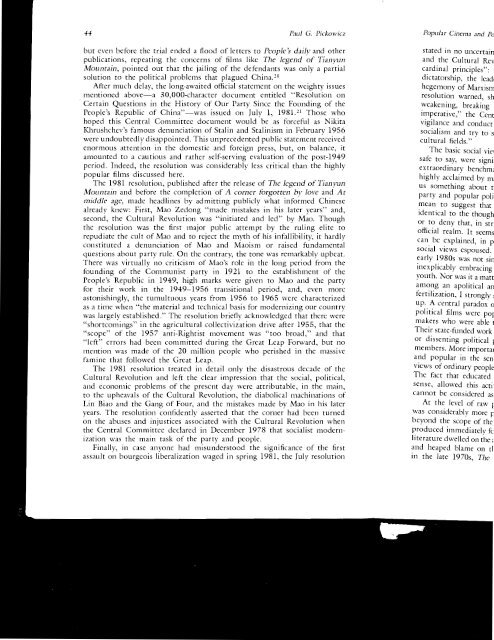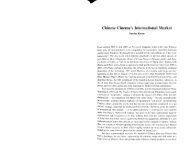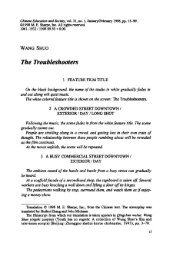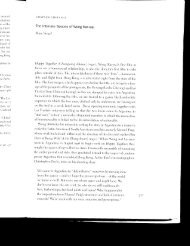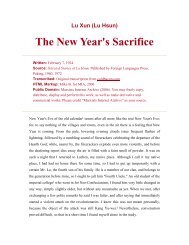Popular Cinema and Political Thought in Post-Mao China
Popular Cinema and Political Thought in Post-Mao China
Popular Cinema and Political Thought in Post-Mao China
You also want an ePaper? Increase the reach of your titles
YUMPU automatically turns print PDFs into web optimized ePapers that Google loves.
44 Paul G. Pickowiczbut even before the trial ended a flood of letters to People's daily <strong>and</strong> otherpublications, repeat<strong>in</strong>g the concerns of films like The legend of TianyunMounta<strong>in</strong>, po<strong>in</strong>ted out that the jail<strong>in</strong>g of the defendants was only a partialsolution to the political problems that plagued Ch<strong>in</strong>a. 20After much delay, the long-awaited official statement on the weighty issuesmentioned above-a 30,000-charactcr document entitled "Resolution on· Certa<strong>in</strong> Questions <strong>in</strong> the History of Our Party S<strong>in</strong>ce the Found<strong>in</strong>g of thePeople's Republic of Ch<strong>in</strong>a"-was issued on July 1, 1981. 21 Those whohoped this Central Committee document would be as forceful as NikitaKhrushchev's famous denunciation of Stal<strong>in</strong> <strong>and</strong> Stal<strong>in</strong>ism <strong>in</strong> February 1956were undoubtedly disappo<strong>in</strong>ted. This unprecedented public statement receivedenormous attention <strong>in</strong> the domestic <strong>and</strong> foreign press, but, on balance, itamounted to a cautious <strong>and</strong> rather self-serv<strong>in</strong>g evaluation of the post-1949period. Indeed, the resolution was considerably less critical than the highlypopular films discussed here.The 1981 resolution, published after the release of The legend of TianyunMounta<strong>in</strong> <strong>and</strong> before the completion of A comer forgotten by lm·e <strong>and</strong> Atmiddle age, made headl<strong>in</strong>es by admitt<strong>in</strong>g publicly what <strong>in</strong>formed Ch<strong>in</strong>esealready knew: First, <strong>Mao</strong> Zedong "made mistakes <strong>in</strong> his later years" <strong>and</strong>,second, the Cultural Revolution was "<strong>in</strong>itiated <strong>and</strong> led" by <strong>Mao</strong>. <strong>Thought</strong>he resolution was the first major public attempt by the rul<strong>in</strong>g elite torepudiate the cult of <strong>Mao</strong> <strong>and</strong> to reject the myth of his <strong>in</strong>fallibility, it hardlyconstituted a denunciation of <strong>Mao</strong> <strong>and</strong> <strong>Mao</strong>ism or raised fundamentalquestions about party rule. On the contrary, the tone was remarkably upbeat.There was virtually no criticism of <strong>Mao</strong>'s role <strong>in</strong> the long period from thefound<strong>in</strong>g of the Communist party <strong>in</strong> 1921 to the establishment of thePeople's Republic <strong>in</strong> 1949, high marks were given to <strong>Mao</strong> <strong>and</strong> the partyfor their work <strong>in</strong> the 1949-1956 transitional period, <strong>and</strong>, even moreastonish<strong>in</strong>gly, the tumultuous years from 1956 to 1965 were characterizedas a time when "the material <strong>and</strong> technical basis for moderniz<strong>in</strong>g our countrywas largely established." The resolution briefly acknowledged that there were"shortcom<strong>in</strong>gs" <strong>in</strong> the agricultural collectivization drive after 1955, that the"scope" of the 1957 anti-Rightist movement was "too broad," <strong>and</strong> that"left" errors had been committed dur<strong>in</strong>g the Great Leap Forward, but nomention was made of the 20 million people who perished <strong>in</strong> the massivefam<strong>in</strong>e that followed the Great Leap.The 1981 resolution treated <strong>in</strong> detail only the disastrous decade of theCultural Revolution <strong>and</strong> left the clear impression that the social, political,<strong>and</strong> economic problems of the present day were attributable, <strong>in</strong> the ma<strong>in</strong>,to the upheavals of the Cultural Revolution, the diabolical mach<strong>in</strong>ations ofL<strong>in</strong> Biao <strong>and</strong> the Gang of Four, <strong>and</strong> the mistakes made by <strong>Mao</strong> <strong>in</strong> his lateryears. The resolution confidently asserted that the corner had been turnedon the abuses <strong>and</strong> <strong>in</strong>justices associated with the Cultural Revolution whenthe Central Committee declared <strong>in</strong> December 1978 that socialist modernizationwas the ma<strong>in</strong> task of the party <strong>and</strong> people.F<strong>in</strong>ally, <strong>in</strong> case anyone had misunderstood the significance of the firstassault on bourgeois liberalization waged <strong>in</strong> spr<strong>in</strong>g 1981, the July resolution<strong>Popular</strong> <strong>C<strong>in</strong>ema</strong> <strong>and</strong> PoJstated <strong>in</strong> no uncerta<strong>in</strong><strong>and</strong> the Cultural Revccard<strong>in</strong>al pr<strong>in</strong>ciples": tdictatorship, the leadchegemony of Marxismresolution warned, sheweaken<strong>in</strong>g, break<strong>in</strong>gimperative," the Centvigilance <strong>and</strong> conductsocialism <strong>and</strong> trv to s·cultural fields." 'The basic social vie\safe to say, were signiJextraord<strong>in</strong>ary benchmahighly acclaimed by m


